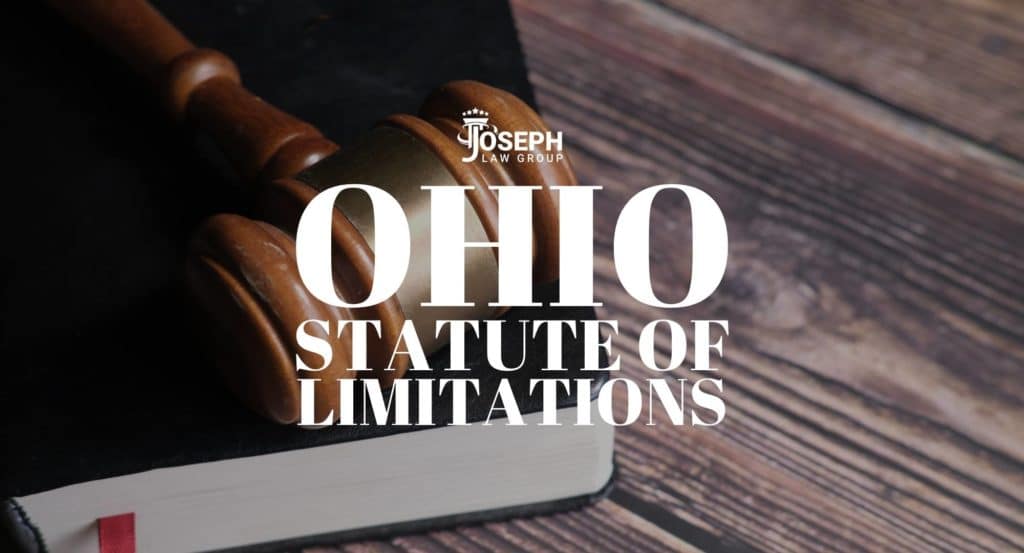Like other states, Ohio has its own set of laws that set a limit on how long someone may bring forward a claim against the accused based on the type of legal action and its severity. In this post, our Ohio attorneys at the Joseph Law Group will break down these limitations, laws, and exceptions pursuant to the Ohio Revised Code. Though we will provide the time limits for several different types of actions, remember that at Joseph Law Group, we are solely a personal injury law firm. That means we cannot provide legal assistance on any criminal matters or other civil claims apart from those relating to personal injury.
For more information or to speak with one of our experienced Cleveland personal injury attorneys, feel free to give us a call at (216) 522-1600.
What is the Statute of Limitations in Ohio?
Each state in the United States has its own set of laws that govern the time limits that certain parties have to initiate legal proceedings from the date of the initial offense or accident. This is called a statute of limitations. Different statutes apply to both civil lawsuits and criminal charges, and the laws vary by jurisdiction. The Ohio Revised Code provides statutes of limitations for civil actions including personal injury claims, property actions, contract actions, tax refunds, and actions against the government. It also provides time limits for prosecutors to file criminal charges against the accused.
The length of time provided in the statute of limitations ultimately depends on the type of action and the severity of the offense. For civil cases, the plaintiff must bring a lawsuit for the case within the time frame provided by the Ohio statutes, beginning from the date of the injury, accident, damage, or offense. Likewise, for criminal cases, prosecutors must bring criminal charges within the statutes and beginning from the date the alleged crime was committed.
What is the Ohio Statute of Limitations for Tort/Personal Injury Actions?
Personal injury or “tort” law works to protect individuals and/or their property from injury and harm caused by another person’s negligent actions. In a successful personal injury claim, the at-fault party will pay financial damages (compensation) to the plaintiff. Below are the statutes of limitations in Ohio for different tort and personal injury claims.
Bodily Injury & Injury to Personal Property
According to the Ohio Revised Code (ORC 2305.10), the statute of limitations for personal injury lawsuits is TWO YEARS from the date the injury or loss to person or property occurred. This applies to both bodily injury and damage to personal property.
Exceptions to Personal Injury Statutes of Limitations
There are certain circumstances that when presented may delay or pause the statute of limitations for tort claims. Some factors that might extend the two-year deadline of the general statute for personal injury claims include:
- The defendant (at-fault party) accused purposely avoids prosecution by leaving the state or going into hiding. In this case, the time of absence or concealment on the defendant’s part will not be counted toward the two-year deadline.
- The injured party has a legal disability (is a minor under the age of 18 or is deemed “of unsound mind”) at the time of the incident. In this case, the two-year deadline is delayed until the disability is lifted, meaning the victim reaches the age of 18, is legally deemed sane/competent, or a public children services agency is properly notified.
- The lawsuit is based on injuries caused by a defective product. In these cases, particularly if a product warranty or consumer fraud is involved, a separate deadline for filing may apply.
Medical Malpractice
For a valid medical malpractice claim to be brought against a medical, dental, optometric, or chiropractic professional, Ohio’s statute of limitations requires it to be brought within ONE YEAR from the cause of action (ORC 2305.113). This means injured parties have one year from the date of the injury to file a lawsuit, although there are some exceptions that may extend that deadline. For example, if the patient continues to treat with that doctor, then the one-year limitation will likely not begin until the last date of treatment with that doctor. In addition, if the injury is not known and could not be known until later, then a claim can still be pursued, possibly up to four years after the date of injury, so long as it is not filed more than a year after the injury was discovered. These types of cases vary greatly depending on the specific facts, so if you have questions and would like to discuss the unique circumstances surrounding your case, and how these time limits apply to you, call a Cleveland medical malpractice attorney from our law firm today.
Wrongful Death
Under ORC 2125.02(D), a wrongful death lawsuit in Ohio must be brought within TWO YEARS of the victim’s death. If you were not and could not have possibly been aware that a wrongful death legal claim was an option at the time of the decedent’s death, this deadline may be extended. Please speak with one of Joseph Law Group’s wrongful death lawyers in Ohio to learn more about potential exceptions for these types of claims.
Assault and Battery
Like many states, Ohio provides limitations statutes governing civil claims for assault and battery. Remember, a person does not need to be found guilty of the offense in criminal court to be found liable for the same conduct in a civil case. Under ORC 2305.111(B), a civil action for assault and battery must be brought within ONE YEAR after the cause of the action accrues, which may be any one of the following depending on the circumstances of the case:
- The date the assault and/or battery took place;
- The date on which the victim learns the accused’s identity; or
- The date on which the victim should have reasonably learned the accused’s identity.
Childhood Sexual Abuse
According to ORC 2305.111, childhood sexual abuse means any conduct that “would constitute a criminal offense under the specified section or division of the Revised Code, if the victim of the violation is at the time of the violation a child under 18 years of age or a child with a developmental disability or physical impairment under 21 years of age.” According to the Code, when the victim is a minor, they have 12 YEARS from the day they become of age (turn 18) to file a lawsuit. As such, a child sexual abuse survivor must bring their claim forward before their 30th birthday.
Libel, Slander, Malicious Prosecution, & False Imprisonment
Pursuant to ORC 2305.11, a civil action for libel, slander, malicious prosecution, false imprisonment, or a malpractice action not against a medical professional must be brought within ONE YEAR from the cause of action.
Fraud
To bring a civil action for fraud, a plaintiff must present their claim within FOUR YEARS of the cause of action, unless the action is that of identity fraud, in which case the statute of limitations is extended to five years.
What is the Ohio Criminal Statute of Limitations?
Just as the state outlines different time limits for bringing forth a civil claim, it also provides statutes of limitations for criminal offenses in Ohio (ORC 2901.13). There are different limits set depending on the severity of the crime, as you’ll see below.
Felony
Ohio’s statute for criminal offenses is broken down into different categories. In general, charges for felonies must be filed within SIX YEARS. The more violent crimes such as rape and sexual battery have a deadline of 25 YEARS. The statute of limitations for committing or conspiracy to commit any of the following offenses is 20 YEARS:
Voluntary manslaughter; involuntary manslaughter; kidnapping; trafficking in persons; unlawful sexual conduct with a minor; gross sexual imposition; prostitution; aggravated arson; soliciting or providing support for act of terrorism, including making terroristic threats and money laundering in support of terrorism; possession, use or assembly of any chemical, biological, radiological, or nuclear weapon or explosive device; robbery; burglary; aggravated robbery or burglary; aggravated riot; assault; felonious or aggravated assault (if the victim is a peace officer).
Misdemeanor
Prosecutors must bring criminal charges for a general misdemeanor within TWO YEARS from the time of the alleged crime.
Minor Misdemeanor
In Ohio, minor misdemeanors are typically only punishable by a maximum fine of $150. Examples of minor misdemeanors include reckless driving, simple possession of marijuana, and disorderly conduct. Under Ohio law, charges for these offenses must be brought within SIX MONTHS.
Exceptions to Ohio’s Criminal Statutes
As always, there are some exceptions to the state’s criminal statutes. Perhaps the most notable is that the crimes of murder and aggravated murder do not have a statute of limitations, meaning these charges can be brought at any time following the offense. Other exceptions to this statute include:
- The suspect purposely avoids prosecution.
- The corpus delicti remains undiscovered.
- The accused already has a pending case for the same conduct.
- The case is that of childhood abuse or neglect and the victim is under the age of 18 or has a disability and is under the age of 21.
What is the Ohio Statute of Limitations for Property Actions?
Evictions; Forcible Entry and Detainer
Under ORC 1923.01, an action for forcible entry and detainer must be brought within TWO YEARS.
Recovery of Real Property; Adverse Possession
According to ORC 2305.04, an action to recover possession of real property should be brought within 21 YEARS. However, if the injured party has a legal disability (is a minor under the age of 18 or is deemed “of unsound mind”) at the time of the incident, they may toll this statute of limitations and bring action within 10 years after the disability has been removed.
Taking or Detaining of Personal Property; Recovery of Personal Property
ORC 2305.09 (B) provides the statutes for taking, detaining, or recovering personal property. The deadline for a civil action to be brought for these types of claims is set at FOUR YEARS.
Trespassing on Real Property
Under ORC 2305.09 (A), a civil action for trespassing must be brought within FOUR YEARS.
What is the Ohio Statute of Limitations for Contract Actions?
Breach of Contract for Sale of Goods
Pursuant to ORC 1302.98, a civil lawsuit for a breach of contract for sale of goods must be brought within FOUR YEARS from the date of the cause of action.
Contract in Writing
An action brought forward regarding a contract in writing must be brought within SIX YEARS (ORC 2305.06).
Contract Not in Writing
An action brought forward regarding a contract not in writing must be brought within FOUR YEARS (ORC 2305.07).
Certain Actions by Employees for Payment of Wages
ORC 2305.11 states that “an action by an employee for the payment of unpaid minimum wages, unpaid overtime compensation, or liquidated damages” must be brought within TWO YEARS from the incident.
What is the Ohio Statute of Limitations for Tax Refunds?
Municipal Income Tax Refund
ORC 718.12 lays out the statute of limitations for municipal income tax refunds. According to the legislation, actions to recover municipal income taxes and penalties must be filed within THREE YEARS after the tax was due or the return was filed (whichever occurs later) OR ONE YEAR after the conclusion of the deferral period, if applicable.
State Corporate Tax Refund
Applications for a state corporate tax refund for taxes that are overpaid or paid illegally or erroneously must be filed with the tax commissioner within THREE YEARS from the date of the wrongful tax payment, according to ORC 5733.12.
State Income Tax Refund
ORC 5747.11 states that applications for a state income tax refund must be filed with the tax commissioner within FOUR YEARS from the date of the “illegal, erroneous, or excessive payment of the tax.”
What is the Ohio Statute of Limitations for Actions Against the Government?
Actions Against the State
Section 2743.16 of the Ohio Revised Code states that any civil actions against the State and in the Court of Claims must be commenced no later than TWO YEARS after the alleged cause of action.
Actions Against Political Subdivisions
Any action, cross-claim, counterclaim, third-party claim, or claim for subrogation brought against a political subdivision for injury or loss to a person or property has a limitation of TWO YEARS (ORC 2744.04).
Don’t Wait Until It’s Too Late – Call the Cleveland Personal Injury Lawyers at Joseph Law Group Now
Joseph Law Group is a Cleveland-based personal injury law firm that represents clients from all over the great state of Ohio. Our experienced attorneys have successfully litigated many types of personal injury cases, ensuring that our clients receive the justice they deserve.
To speak with a lawyer from Joseph Law Group, give us a call at (216) 522-1600 for a free consultation. An attorney from our firm would be happy to discuss your case with you or answer any questions you may have.

















